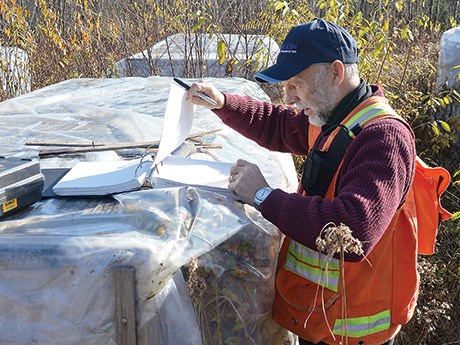Petalite for high-strength glass manufacturers, lepidolite for battery market
Avalon Advanced Materials, owner of the Separation Rapids lithium property 70 kilometres north of Kenora, has entered into an agreement with Australia-based Lepidico to supply the lithium mineral lepidolite for a proposed demonstration plant in Sudbury. It’s also in the advanced stages of negotiating offtake agreements with glass manufacturers for the deposit’s more abundant petalite resource, another lithium mineral.
A pared down preliminary economic assessment (PEA) released by the junior miner in August envisions a throughput rate of 475,000 tonnes per year compared to the 950,000 tonnes per year cited in the company’s 2016 PEA. It also backs away from the much more capital intensive option of building a processing plant to produce the chemical form of lithium for the battery market.
“Everyone knows about lithium because of its importance in energy storage technology, but it’s not the only application of lithium,” said Don Bubar, president and CEO of Avalon Advanced Materials. “The biggest application of lithium historically has been as an ingredient in high-strength and thermal shock resistant glass products, including Corningware, glass stovetops and fireplace shields.
“It’s a big and growing market and they’re finding it more and more difficult to buy lithium to meet their needs because of the battery market demand aggressively scooping up supply.
“Also, this particular lithium mineral (petalite) that we have at Separation Rapids is a very rare lithium mineral and the preferred source of lithium for the glass market. It’s a pure lithium aluminum silicate, and the aluminum and silica are also used in the manufacture of these high-strength glass products.”
According to Bubar , the Separation Rapids deposit is the only potential new source of supply in the world for this lithium mineral.
The company’s 2016 PEA looked at the opportunity to produce battery material from petalite, but it would be a much more capital intensive project “because you have to make the mineral concentrate, then you need to have a separate processing plant to turn it into the derivative chemical form – either a carbonate or a hydroxide,” said Bubar.
The lithium mineral that’s most commonly used to supply the battery market is spodumene, very little of which is found at Separation Rapids. Brine deposits in Chile and Argentina are another important source of lithium.
The August PEA envisions annual production of 71,500 tonnes of petalite and 11,800 tonnes of lepidolite for 18.5 years.
Upfront capital cost was estimated at $77.7 million.
Bubar took exception to a recent Northern Miner editorial highlighting concerns about a possible oversupply of lithium.
“In many cases, you have companies that are aspiring new producers making optimistic forecasts about new supply and analysts just accepting them at face value without factoring in any risk of delays. Producing lithium is a lot trickier than most people realize,” he cautioned. “Lithium in the chemical form is a highly refined product that must be made to very high purities. There are a lot of examples already of aspiring new lithium producers getting started and the product is off-spec, and when the product is off-spec, it’s worth nothing. The customer will ship it back.
“There’s a lot of analysis and research being done by investment banking firms that put people on the job of producing these reports who just don’t have the experience in specialty products to analyze them properly,” complained Bubar. “There are a few good services that are covering the sector. The one we rely on is Benchmark Mineral Intelligence. They talk to everyone in the supply chain, so they have a much more in-depth knowledge of the sector, and they’re not predicting any oversupply.”
The primary requirement for advancing the Separation Rapids project is the negotiation of offtake agreements with glass manufacturers. With offtake agreements in place, Avalon will be able to make a business case for the required capital investment.
“That’s where we’re at now – getting those commitments,” said Bubar.
The proposed mine will be an open pit operation with the potential to go underground via a decline. To date, the company has only drilled down to 200 metres and doesn’t know the full extent of the orebody, although an additional discovery of a similar deposit was recently discovered on the company’s property four kilometres away, “providing assurance that there are more resources there to be developed and to extend the life of the operation.”
The company has already completed a lot of the work required for an environmental assessment and hopes to “get going on it in parallel with final feasibility-level work” next year.



.jpg;w=120;h=80;mode=crop)